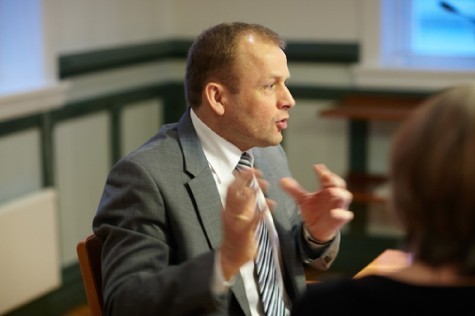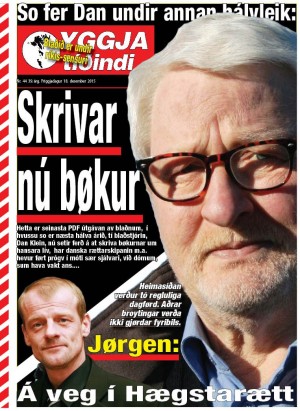
Flaggdagsrøðan hjá løgmanni í London
25. apríl 2012 helt løgmaður røðu á flaggdagshaldi í London í móttøkuhølinum á donsku sendistovuni, har føroyska sendistovan húsast.
Speech delivered by H. E. Kaj Leo Holm Johannesen, Prime Minister, at the Faroese Flag Day Reception in London on 25 April 2012
Distinguished Members of Parliament, Your Excellencies, my lord, Ladies and Gentlemen,
It is an honour and a pleasure for me to be with you in London today to celebrate our national Flag Day. We consider this to be our national day, as it was on this day that our flag became recognised by the international community.
Indeed, there could be no better place to celebrate this event, as the story of the Faroese flag is the tale of the close bonds between the Faroese and British people.
Soon after the outbreak of the Second World War, Denmark was occupied by Nazi Germany and shortly after Norway followed. In order to ensure that this expansion could not continue Britain acted - and occupied the Faroes. As a large number of Faroese boats shipped fish to Britain, a Faroese flag became a necessity, so that that the Faroese ships would be perceived as allies rather than enemies.
On the 25th of April 1940, the British Government along with her wartime allies recognised our flag as the official flag of the Faroes. We still celebrate this day as our flag day - a very important day for the Faroese people, both culturally and politically.
The Second World War brought the Faroes and Britain close together. Britain conducted a friendly occupation of our island and a large number of British soldiers were posted to the Faroes during the war. These soldiers soon won the hearts and minds of the local population and the Faroese people only have fond memories of the British stay in the Faroes.
I have been told that one of the last remaining veterans from the Second Word War, Mr Harry Wilson is with us here today. Mr Harry Wilson served in the Faroes during the war, where he also met his wife.
On behalf of the Faroese people I would like to extend my gratitude to Mr Wilson and all other British soldiers who during the war and thereafter have helped to defend our islands.
The presence of the British soldiers during the war had a profound influence upon our culture and language. A wide number of words derived from the English language made it into our vocabulary. Faroese people began to use British products and also to some extent to take on British habits and pastimes.
The cooperation between the two countries was not one sided as the efforts of the Faroese people also touched on the everyday life of ordinary people in Britain during the war. The Faroes became one of the main suppliers of food to the British people as nearly all fish came from Faroese vessels.
Fortunately, this story is not only history but a living testimony to the close bonds between our peoples. Britain is still one of our closest partners and close cooperation between our two countries is still thriving. We import many products from Britain; we also import many ideas from Britain and enjoy much of British culture.
Luckily, the cooperation between our two countries still works both ways, as the Faroes continue to play a role in the everyday life of many British people. Britain still imports much of its fish products from the Faroes. As well as this, the Faroes is becoming a more popular tourist destination amongst the British. There are also other areas where there is a growing cooperation between the Faroes and Britain such as telecommunications, the oil industry and in the field of higher education.
***
Ladies and Gentlemen,
Thomas Jefferson once said that the banking establishments are more dangerous than standing armies.
I took office as Prime Minister during the autumn of 2008 and soon learned that there still was a great deal of truth in this statement made by Jefferson 200 years ago. The collapse of some of the major international banks created a global banking crisis. This in turn led to a global financial crisis, which has caused so much hardship for ordinary people and left governments around the world in severe difficulties.
As a small and open economy, the Faroes is often amongst the first to feel the changing currents of the global financial system. Therefore, the Faroes was amongst the first to feel the effects of the adverse climate of the global financial system.
At this time it felt like all the chips were down. The prices on our export markets were falling and so were the revenues. Unemployment was rising as was the debt level of the private and public household.
From the outset we realized that the task for my government to steer the ship into safer waters was enormous. However, we learned to face the music and realised that the only way forward was to follow the British example from the Second World War: “Keep Calm and Carry On”.
In order to get the Faroese economy back on track, it has been necessary to carry out major changes within all policy areas. It has been necessary to impose reforms and cut spending in all areas of government. In order to keep public services at the same level, the Government is introducing reforms in a number of areas together with merges of some governmental institutions.
Based on the principles of stability, fairness and sustainability, reforms are being made within fisheries. In order to meet the future needs for education, the Government has sought to create a higher standard of general education and a wider choice for the Faroese youth. Policy areas such as care for the elderly and primary education will be transferred from the central government to local councils. To encourage private spending and enterprise, the Government has introduced a new progressive flat taxation system.
Governments around the world have been forced to cut their spending on the Foreign Service and the Faroes are no exception. In order to meet the tight budgets, the Government has decided to merge the Representations in London and Brussels. This means that the office of the Representation here in London will close but its operations will still continue. The Faroes will continue to have a Representative in the United Kingdom, but the administration will be carried out at the office in Brussels. I am very confident that our current Representative will manage the relations with the UK from Brussels.
The Representation of the Faroes in London has been very active in promoting good relations between the UK and the Faroes. I feel confident that we will be able to continue strengthening our close bonds even further, in spite of these administrative changes.
I can assure you that our tradition of celebrating our Flag day in London will continue in years to come and the good relations between Britain and the Faroes will remain strong to our mutual benefit.
Finally, I would like to thank you for your time and consideration and I hope we will have a pleasant evening.











